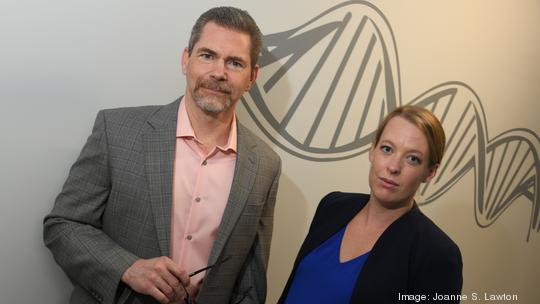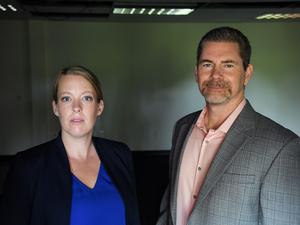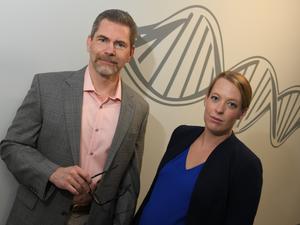
The small Reston company cracking cold cases across the country has its eye on another area for 2021: pharmaceuticals.
Parabon NanoLabs Inc., which uses DNA technology and genetic genealogy to help law enforcement solve decades-old crimes, is making a push in its therapeutics division. On its to-do list? Advance a pipeline of drug compounds for cancer and infectious diseases, commercialize a virtual reality software for researchers and pharmaceutical companies and bring to market diagnostics that detect unknown pathogens.
Parabon not only analyzes DNA — for instance, to generate leads for police investigations — but also builds things out of DNA. That’s where its work in therapeutics comes into play.
“There may be a variety of applications in DNA nanotechnology that we don’t yet appreciate, but we know if you can program matter to control what DNA allows, there are going to be any number of exciting applications coming out of it,” said Parabon co-founder and CEO Steve Armentrout. “So we’re working on specific applications but we’re also working on the platform technologies that enable this work.”
The company is working with federal agencies to do what Armentrout describes as “programming matter,” or manipulating DNA into shapes that can serve certain functions.
“So the minute you begin realizing that’s possible, now you’re talking about a rational drug design platform,” he said.
Parabon's platform has diagnostic, treatment implications
Its Essemblix platform makes “smart drugs,” tiny structures known as nanosensors that carry therapeutics and can detect specific molecules in diseases such as cancer. Parabon is now using that platform to develop a treatment for prostate cancer with Johnson & Johnson’s (NYSE: JNJ) Janssen Pharmaceuticals Inc. and an HIV vaccine with funding from the National Institutes of Health’s National Institute of Allergy and Infectious Disease.
These initiatives are in preclinical stages with clinical trials and eventual regulatory approvals on the roadmap. “If the science bears it out, absolutely that’s the plan,” Armentrout said of submitting for FDA approval.
Along the way, Parabon’s therapeutics team is also building a diagnostic that can recognize specific molecules — for example, for military forces that often encounter new pathogens, Armentrout said. The company has funding from the Department of Defense’s Small Business Innovation Research program for this work, which could get to market faster because of fewer regulatory hurdles than in the pharmaceutical space.
The firm is also preparing to release this year its inSēquio software, which allows the user to manipulate DNA in virtual reality environment, making it “far easier to do that kind of work” than on a two-dimensional screen, Armentrout said. Parabon intends to license it to researchers in the field and pharmaceutical companies performing early-stage work.
Nanosensors an 'exploding' field
While there's "a lot of great academic research" on nanosensors, Armentrout said, Parabon has been one of only a handful of companies working on them. Until now, “there’s been a lot of innovation that needed to happen to make this practical, and the whole field is exploding," he added.
Parabon’s work in this space predates the Covid-19 pandemic by more than a decade — it formed the therapeutics subsidiary in 2008.
“We began to realize that this combination of software technology with chemistry was really essential if this field was going to move forward,” Armentrout said, “so we’ve been working on the fundamental, both techniques and the software, to enable it for a long while now — and we’re starting to see some of the fruits of that labor.”
The 25-person company is planning to hire up this year and expecting to see revenue grow 10% in 2021, Armentrout said, declining to disclose specifics. That’s after the pandemic slowed its cold case work for a period in 2020 and temporarily shut down its West Virginia lab. Still, Parabon was “more fortunate than most,” Armentrout said, in that it was largely able to continue doing its work — and even got a small bump following the May debut of an ABC docuseries about its genetic genealogy division.
Crime work continues despite Covid
Parabon closed the year with nearly 50 positive identifications of perpetrators in previously unsolved crimes, including locally a series of rapes near the Falls Church Metro station and a murder in Virginia Beach, both from the early 1990s.
“We were thrilled to be essentially operating at the same through-put as the previous year,” Armentrout said, adding that this year “we’re seeing an uptick.”
Armentrout and his wife, Paula, founded Parabon in 1999 as a computing software provider before gradually transitioning to DNA technology. Then in spring 2018, the company recruited genetic genealogist CeCe Moore to build out its genetic genealogy division, around the time West Coast authorities used the science to help catch the so-called Golden State Killer, one of the most prolific serial killers in history.
Parabon, a Washington Business Journal and DC Inno Fire winner of 2020, has since been involved in hundreds of police cases and generated leads resulting in 155 positive identifications of suspects.




